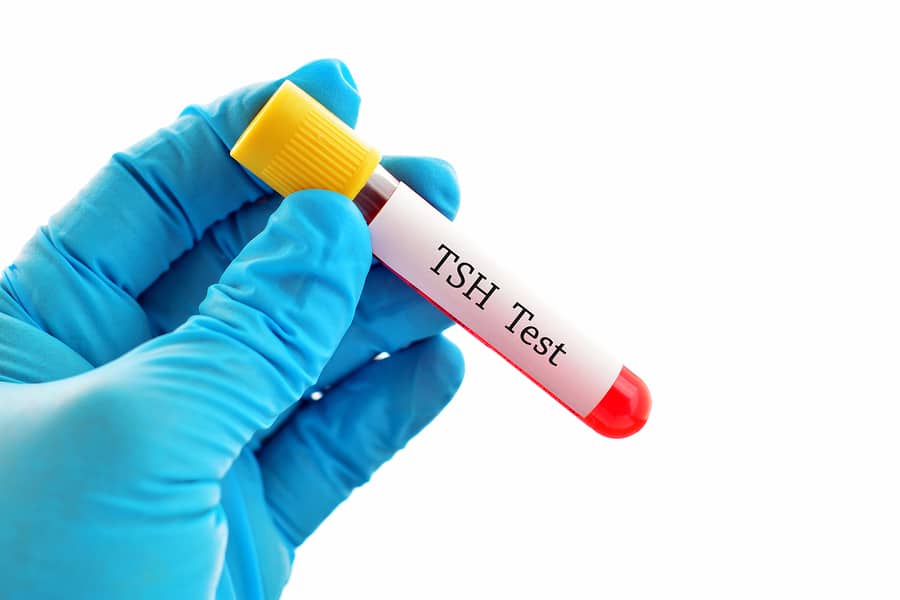Low thyroid function, hypothyroidism and elevated TSH levels are very common these days, but I’m excited to tell you that there are ways to reduce TSH naturally, without spending tons of money on supplements.
Let’s dive in!
First, let’s review what TSH is and what a “normal” level is (this is important to understand, so please read these next few paragraphs before going down to the 7 steps listed below!):
TSH is a hormone that the pituitary sends out to tell the thyroid how much or how little thyroid hormones to produce.
Please note: TSH levels tell you what your pituitary is up to, but it’s not telling you what the thyroid is doing.
Everyone is biochemically individual, but at our practice we’ve found that a TSH level between 0.5-2.0 is the range where people feel healthy and vibrant. Most labs have “normal” TSH ranges that span anywhere from 4.0-8.0, but most people with TSH levels this high don’t feel well and need to take some steps to reduce their TSH level.
The pituitary, hypothalamus and adrenals (also called the HPA axis) are all part of the endocrine system and communicate with one another throughout the day. When the body perceives stress – emotional, mental, physical, environmental, etc. – the hypothalamus tells the adrenals, via the pituitary, to work harder to put out additional cortisol, and it tells the pituitary to produce more TSH which signals to the thyroid to slow down (and sometimes it can actually cause TSH to lower causing the thyroid to produce excess thyroid hormones.
So, a high TSH level isn’t actually a thyroid problem. Instead, there’s some sort of imbalance in the HPA axis.
Now that we understand what TSH actually is, here are 7 Steps to Reduce TSH Naturally:
1. Take steps to support your adrenals. As mentioned above, high TSH is rooted in an imbalance in the HPA axis, and one of the most common causes of high TSH is adrenal imbalance from stress (mental, physical, emotional, environmental, etc.).
I can’t tell you how many people have taken the steps I list in this article and come back a month or two later telling me how much better they already feel! I’ve also had clients in our practice follow many of these steps, and we’ve seen their TSH levels balance out within just a couple of months.
2. Make sure your body is digesting your food properly so it can use the nutrients to keep your body in balance. When your body can’t digest your food properly and use the nutrients in the food, this causes a state of stress in the body. The hypothalamus sees this stress and tells the pituitary to create excess TSH to compensate.
The first way to digest your food properly is by eating in a relaxed state, making sure your body is producing enough stomach acid so it can properly break down and utilize the nutrients in your food. Stomach acid (also known as Hydrochloric acid or HCL) is a necessary part of the digestive process. The acid is our first line of defense against pathogens, bacteria, parasites, etc., and helps us digest our food properly.
This may sound like a trivial step, but I’ve never seen a client at our practice with hypothyroidism and elevated TSH that wasn’t also dealing with low stomach acid. Here’s an article I wrote that explains the steps to take.
3. Limit caffeine – Caffeine is actually very stressful for the adrenals, which can cause the hypothalamus to tell the pituitary to raise TSH, so it’s really best to limit your coffee consumption.
If you need some help reducing how much coffee you drink (I know it can be hard!), then read this article I wrote about how to kick the caffeine habit without having the crazy withdrawal symptoms.
4. Check your vitamin D levels – Vitamin D deficiency has been strongly associated with higher TSH levels.
5. Make sleep a priority. The body cannot heal and come back into balance without adequate sleep. If insomnia is an issue right now, read this article and see which steps you can take to improve your quality of sleep.
6. Avoid skipping meals, intermittent fasting or super low-carb diets (such as keto) – All of these things can put excess strain on the adrenals, cause them to kick out additional cortisol and then create an imbalance in TSH.
I know intermittent fasting and low carb diets like Keto are popular right now, and sometimes those with thyroid disease will feel good for a short time period while on one of these kinds of diets, but they usually backfire down the road. It simply puts too much strain on an already stressed body and creates additional hormone imbalance, so I really don’t recommend it. Here’s more info on this topic.
7. Supplement with B6 and B12 – B Vitamins are very calming to the nervous system, which is helpful to balance the HPA axis and TSH. Cataplex B is a great supplement option.
If you take these steps for at least 90 days and don’t see any improvement in either symptoms or TSH levels, then it’s possible you need some additional support for the hypothalamus, pituitary, or adrenals. There could also be an infection or damage to the glands from pharmaceuticals or other synthetic toxins.
8. Get a full thyroid panel so you know what your thyroid hormone levels are. There is a feedback loop between fT4 and TSH and sometimes when fT4 is low, this will increase TSH. This isn’t always the case, so this is why it’s always a good idea to get tested.
Here’s the list of labs to ask for (if your doctor won’t order labs for you, you can order them here:
TSH
TPOab
TgAB
Free T3
Free T4
Reverse T3





73 Comments